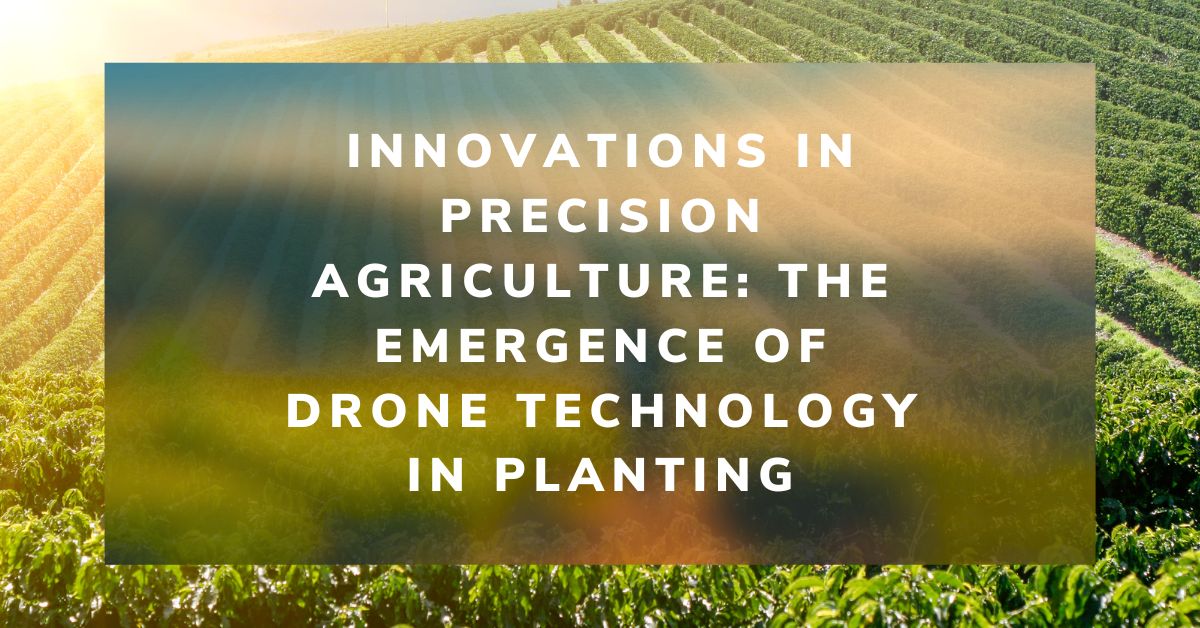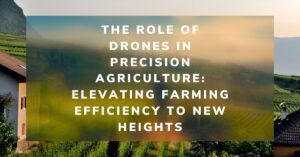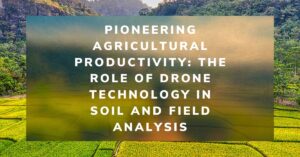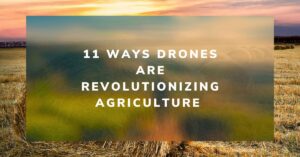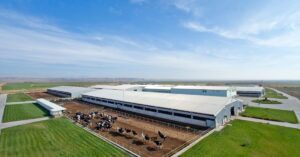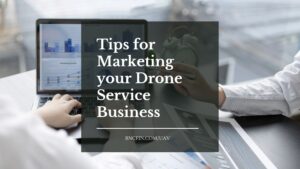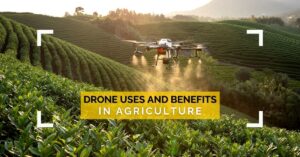The agricultural sector is poised for a technological revolution, with drone innovations marking a pivotal shift in farming methodologies. Specifically, integrating drones into the planting phase of crop cultivation presents a remarkable leap forward, advancing efficiency with precision in an unprecedented manner. This advancement is encapsulated in developing drones equipped with seed pod shooters, a technology that promises to redefine planting parameters. This article explores the mechanics, benefits, and future potential of drone-assisted planting, offering insights into its transformative impact on agriculture.
The Mechanics of Drone-Assisted Planting
At the forefront of this innovation are drones designed to deploy seed pods accurately across vast agricultural fields. These aerial vehicles are equipped with advanced systems that allow for the precise delivery of seeds at optimal locations, depths, and spacings. Utilizing sophisticated algorithms, GPS navigation, and real-time data, these drones can systematically navigate over fields, ensuring each seed pod is planted in the most conducive conditions for germination and growth. This method starkly contrasts traditional planting techniques, offering a level of precision that was previously unattainable.
Advantages of Drone Technology in Planting
Speed and Efficiency: Drones dramatically expedite the planting process, covering extensive areas in significantly less time than conventional methods. This efficiency speeds up the agricultural cycle and enables farmers to make the most of optimal planting windows.
Precision in Seed Placement: The accuracy of drone-assisted planting ensures that seeds are spaced and buried at ideal depths, fostering uniform germination and robust early growth. This precision directly contributes to higher yields and better crop quality.
Labor Cost Reduction: By automating the planting process, drones reduce the dependency on manual labor, lowering the operational costs associated with planting. This efficiency allows for reallocating human resources to other critical farming tasks.
Accessibility to Difficult Terrain: Drones can effortlessly reach and plant in areas inaccessible to traditional planting machinery due to topographical challenges or size constraints. This capability maximizes the use of available land, potentially increasing the overall arable area.
Promotion of Sustainable Practices: Drone planting minimizes soil disruption, reduces erosion risks, and promotes healthier soil ecosystems. This sustainable approach aligns with modern environmental stewardship principles, contributing to the long-term viability of farming lands.
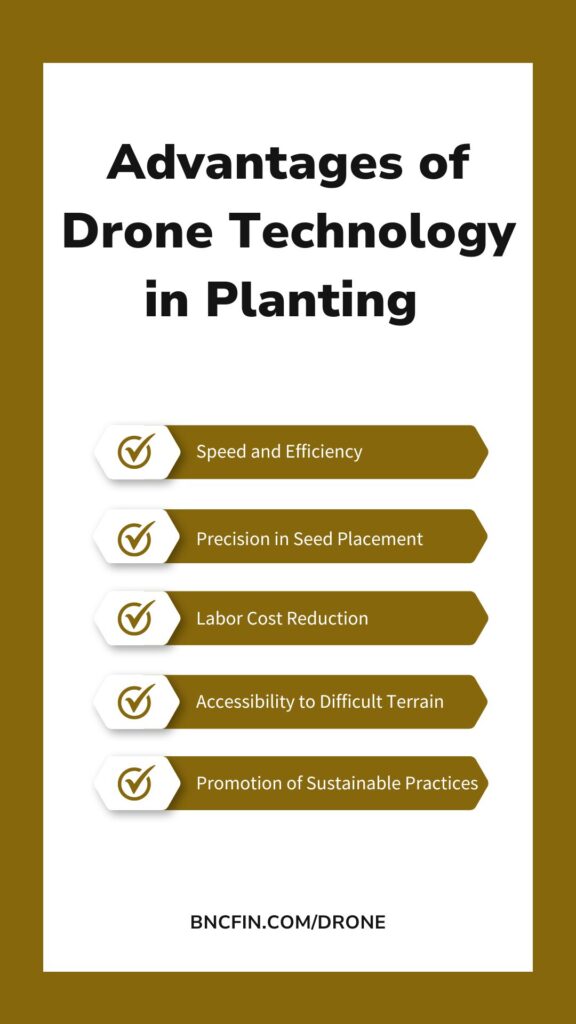
Overcoming Challenges and Looking Forward
While the promise of drone-assisted planting is vast, its adoption is challenging. Current limitations related to drone battery life, payload capacity, and regulatory compliance pose hurdles to widespread implementation. However, the agricultural and technological communities actively engage in research and development efforts to overcome these obstacles. Future enhancements are expected to extend drone operational capabilities, refine the accuracy of seed pod deployment, and streamline regulatory pathways for drone usage in agriculture.
Conclusion
Integrating drone technology in the planting represents a significant milestone in the development of precision agriculture. With its ability to improve accuracy, efficiency and sustainability, drone-assisted planting is poised to transform agricultural practices globally. As technology advances and regulatory frameworks adapt, the potential for drones to become an integral component of modern farming is increasingly becoming a reality. This evolution signifies a step forward in agricultural productivity and the pursuit of sustainable and environmentally friendly farming practices, underscoring the critical role of innovation in shaping the future of agriculture.
Frequently Asked Questions: Drones and Planting for Farms and Agricultural Enterprises
Drones equipped with seed pod shooters are revolutionizing planting processes by enabling rapid, precise seed distribution over large areas. This method significantly improves efficiency by ensuring optimal seed spacing and depth directly from the air, leading to enhanced germination rates and potential increases in crop yields.
Drones designed for planting are versatile and can be used to plant a lot of types of crops, including grains, vegetables, and tree seeds. The technology is particularly beneficial for crops requiring precise spacing and depth, with customizations available to accommodate various seed types and sizes.
Yes, one of the advantages of using drones for planting is their ability to access and plant seeds in terrains that are challenging for traditional machinery, such as steep slopes, wetlands, or densely forested areas. This capability allows farmers to utilize previously underused land efficiently.
Yes, leasing is available for drone planting equipment through BNC Finance, offering flexible terms ranging from 24 to 60 months. This option provides farms and agricultural enterprises with the opportunity to access the latest drone technology without a significant upfront investment, facilitating easier budget management and financial planning. Click here to apply for drone leasing.
Absolutely, financing options are indeed available for those looking to purchase drone planting technology. This financial support makes it more accessible for farms of all sizes to integrate this innovative technology into their operations, enhancing their planting efficiency and crop yield potential. Click Here to Apply for Drone Financing
Drones contribute to more sustainable farming practices by reducing the need for human labor and heavy machinery, which, in turn, minimizes soil compaction and erosion. Additionally, the precision planting offered by drones can lead to less waste of seeds and inputs, promoting more environmentally friendly cultivation methods.
Drone technology utilizes GPS mapping and sophisticated software to plan and execute precise planting patterns. These systems control the release of seed pods at predetermined intervals and locations, ensuring each seed is placed at the ideal depth and spacing for optimal growth conditions.
Operating planting drones requires a basic understanding of drone flight controls as well as specific training on the planting mechanism of the drone. Many manufacturers and leasing companies offer training programs to ensure operators can efficiently and safely use the equipment. Additionally, understanding the software and data analysis tools used for mapping and planning planting operations is crucial.
Initially, the investment in drone planting technology may be more costly than traditional methods due to the cost of the drone and its specialized equipment. However, the increased efficiency, reduced labor costs, and potential for higher yields can result in significant cost reduction over time, making it a financially viable option for many farming operations.
Future advancements in drone planting technology may include longer flight times, greater payload capacities, and more advanced sensors for even more precise seed placement. Innovations in AI and machine learning could further enhance the efficiency and effectiveness of drone planting, making it an even more integral part of modern precision agriculture strategies.
BNC Finance specializes in commercial drone financing and leasing whether you are a business that needs to finance a drone or a dealer looking to offer drone financing.
The Role of Drones in Precision Agriculture: Elevating Farming Efficiency to New Heights
Precision agriculture marks a paradigm shift in how farming approaches, moving from traditional, broad-scale strategies to highly efficient, data-driven methodologies.…
Pioneering Agricultural Productivity: The Role of Drone Technology in Soil and Field Analysis
Soil vitality cannot be overstated in the quest for agricultural excellence. As the foundation of farming, soil health directly influences…
11 Ways Drones are Revolutionizing Agriculture
The incorporation of drone technology into the agricultural sector represents a significant transformation in farming methodologies, encompassing crop cultivation, monitoring,…
Navigating FAA Changes: A Chat with Bryan Sanders on Agricultural Spray Drones Regulations
Part 137 Changes Impacting Agricultural Spray Drones with Bryan Sanders, President of (HSE) UAV, In an industry impacted by dynamic…
The Benefits of Using Drones in Livestock Management
Transforming Agriculture: The Benefits of Using Drones in Livestock Management Technology integration into agriculture has given rise to new methods…
Drone Uses and Benefits in Agriculture
Technological advancements are bringing a revolution in every field of life, and agriculture is also a field that has been dramatically…
